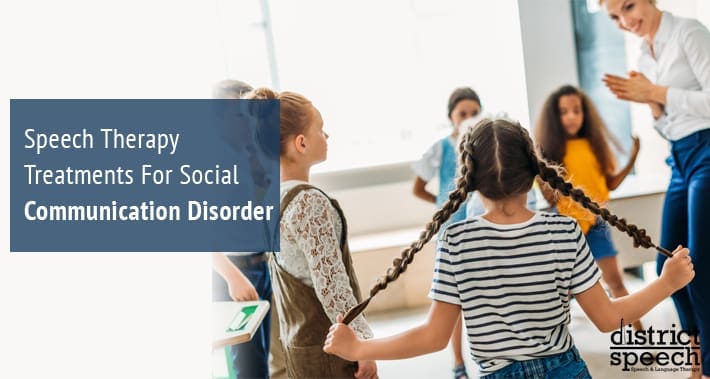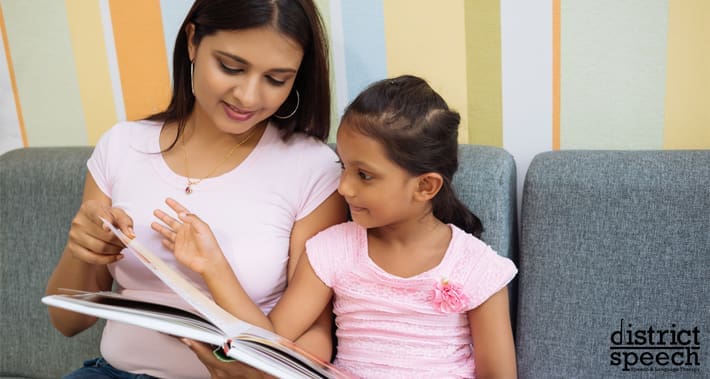
Whether you realize it or not, social communication plays an integral part in your day to day life.
Every day, you make decisions about how to communicate depending on where you are, who you’re with, and why you need to communicate.
There are some social communication rules you’ve likely been directly taught – things like saying please and thank you.
However, there are plenty of unwritten rules to social communication that you’ve probably picked up over time from friends and family as you’ve communicated throughout your life.
Usually, you don’t have to think about any of these rules or structures to social communication – you just subconsciously use them.
These skills don’t come as naturally to everyone, though.
If your child is having trouble with social communication, a pediatric speech language pathologist can help.
At the same time, you might not recognize social communication disorder on the surface.
It’s not a more well known condition for which people receive speech therapy, like stuttering.
Let’s take a closer look at what social communication disorder is, how it works, and how a Washington DC speech therapist can help.
What Are Social Communication Skills?
There are actually three major skills that are involved in social communication.
These skills help you determine how to communicate effectively in different situations.
1. Using Language
Being able to use language is a major skill in social communication.
Using the correct words for different reasons is essential.
For example, if you want to be demanding, you might say, “Give me a cookie now!”.
However, if you want to politely request, you might know to say, “Give me a cookie, please.”
2. Changing Language
Chances are, you know how to change the language you use for a different situation subconsciously.
For example, you probably know that you’d speak in a different way to your boss than you would your best friend, or your child’s teacher.
This also might look like communicating differently in public than at home, or tailoring an explanation based on the knowledge someone else has.
This is sometimes referred to as “code switching” – it’s a popular phrase among minority communities and those with autism spectrum disorder.
RELATED: What Is Autism Spectrum Disorder?
3. Following Rules For Conversations
Something else you probably do subconsciously is understanding when to take turns in a conversation – when you should talk and when you should listen.
You might also use body language and facial expressions to convey meaning without realizing you’re doing it, like pointing, gesturing, or making eye contact as you speak.
Different cultures and even different families can also have their own sets of communication rules.
If you don’t know how to pick up on these rules you may have difficulty knowing how to act in different situations.
What Is Social Communication Disorder?
Social communication disorder happens when someone has trouble using verbal and nonverbal language to communicate socially.
Someone who has social communication disorder may struggle to understand:
- How to speak to different people
- What words to use to communicate what they mean
- What body language or facial expressions to use when they communicate
People with social communication disorder may struggle to make friends, perform successfully in school or work, and participate in social settings.
What Causes Social Communication Disorder?
We don’t currently know what causes social communication disorder.
It can be diagnosed on its own, but it’s common to receive a diagnosis along with another condition.
This includes, but is not limited to:
- An intellectual disability
- Autism spectrum disorder, including nonverbal autism
- ADHD
- Selective mutism
- Down syndrome
- Dyslexia
- Dysgraphia
- Stuttering
- Cluttering
- Traumatic brain injury
- Aphasia
- Stroke
It’s important to note, though, that the above disorders don’t “cause” social communication disorder necessarily.
It’s considered a separate diagnosis.
How To Tell If Your Child Has Social Communication Disorder
There are many symptoms of social communication disorder, although they can look different depending on your child’s age, culture, and the communication context.
Some things you can look out for that might indicate social communication disorder include:
- Struggling to tell or understand stories
- Struggling to use and understand nonverbal cues during conversation and interaction
- Struggling to understand figurative language
- Struggling to use appropriate greetings
- Struggling to make and keep friends

How Can Speech Therapy For Social Communication Disorder Help?
Speech therapy can be an effective tool for helping with social communication disorder.
At District Speech, our speech therapists can help in a variety of ways.
Let’s take a closer look.
1. Social Communication Intervention
In social communication intervention, a speech therapist will work with your child to create goals for social communication and learn how to implement strategies to obtain the goals.
The structure is sometimes referred to as a “plan, do, and review” framework.
In the planning stage, your child will be able to identify communication goals.
In the “do” stage, your child’s speech therapist will help your child socially interact by learning social scripts and supporting them in their social communication.
In the “review” stage, your child will be able to reflect on a social communication situation and identify how their behaviour and the behaviour of others contributed to the outcome.
2. Comic Strip Conversations
Comic strip conversations are illustrated conversations in a comic strip format.
The drawings are simple and used to convey to your child what people might be saying, doing, and thinking in a conversation.
The use of a comic strip conversation allows the conversation to progress slowly, so your child has more time to process all the different kinds of information involved in communication.
They can be useful for conflict resolution, problem solving, communication of feelings, and reflection on a conversation that already happened.
3. Social Skills Groups
Social skills groups allow your child to learn social communication skills in a group setting with peers who also have social communication disorder.
A typical group will involve two to eight children and a speech therapist to facilitate the group.
Your child’s speech therapist will help them through the use of instruction, role play, and feedback along with the other children to guide them to learn how to appropriately interact with their peers.
This is a great option to help mimic real life scenarios and to interact with peers with the support of an expert facilitator.
Book Your Appointment With District Speech Today
Social communication can be a hard skill to learn.
That’s even truer if your child has social communication disorder.
Things that other kids seem to pick up naturally may be a significant struggle for your child.
But it doesn’t have to be that way.
District Speech can help support your child as they learn how to successfully interact with the world.
Book your appointment with District Speech today.
1300 I St NW, Suite 400 E,
Washington, DC 20005
- https://g.page/districtspeech
District Speech and Language Therapy specializes in speech therapy, physical therapy, and occupational therapy solutions, for both children and adults, in the Washington D.C and the Arlington Virginia areas.